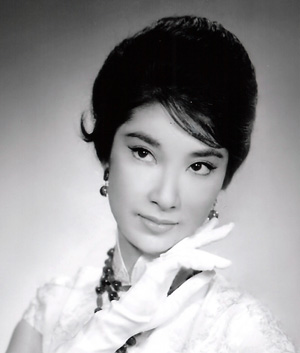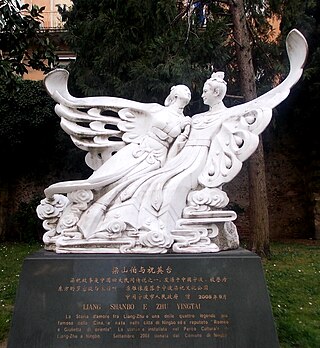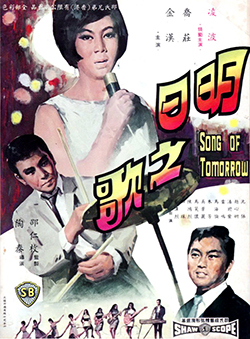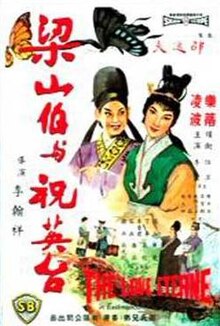
Shaw Brothers (HK) Ltd. was the largest film production company in Hong Kong, and operated from 1925 to 2011.

Betty Loh Ti, known as Loh Tih for short, was a Hong Kong actress originally from Shanghai. Known as the "Classic Beauty", she was one of the most celebrated actresses of Hong Kong cinema. She is most famous for her roles in the 1960 film The Enchanting Shadow, for which she was called "China's most beautiful actress" by the jury of the 1960 Cannes Film Festival, and The Love Eterne, which earned her the Golden Horse Award for Best Leading Actress in 1963. She died from barbiturate overdose at the age of 31.

The Butterfly Lovers is a Chinese legend centered around the tragic romance between Liang Shanbo (梁山伯) and Zhu Yingtai (祝英臺), whose names form the Chinese title of the story. The title is often abbreviated as Liang Zhu (梁祝).
Huang Yu-chun, known by her final stage name Ivy Ling Po, is a retired Hong Kong actress and Chinese opera singer. She is best known for a number of mega-hit Huangmei opera films in the 1960s, especially The Love Eterne (1963) which made her an Asian superstar overnight. She played an important role in the entertainment industry for preserving the Huangmei opera art form.

The Mermaid is a 1965 Hong Kong Huangmei opera film. It was directed by Kao Li and produced by Shaw Brothers Studio, based on Yulan Ji.
Too Late for Love is a 1967 contemporary Hong Kong movie written and directed by Zhen Luo.
The Empress Dowager is a 1975 Hong Kong historical film directed by Li Han-hsiang and produced by the Shaw Brothers Studio, starring Lisa Lu as Empress Dowager Cixi.

Huangmei or Huangmei tone is a form of Chinese opera originating from Anhui province as a form of rural folk song and dance. It has been in existence for the last 200 years and possibly longer. Huangmei opera is one of the most famous and mainstream opera in China, and is a class of the typical Anhui opera. The original Huangmei opera was sung by women in Anhui mountain areas when they were picking tea, and the opera was called the Picking Tea Song. In the late Qing dynasty, the songs were popular in Anhui Huaining County adjacent regions, combined with the local folk art, Anqing dialect with singing and chants, and gradually developed into a newborn's operas. The music is performed with a pitch that hits high and stays high for the duration of the song. It is unique in the sense that it does not sound like the typical rhythmic Chinese opera. In the 1960s Hong Kong counted the style as much as an opera as it was a music genre. Today it is more of a traditional performance art with efforts of revival in mainland China, Hong Kong, and Taiwan, and mostly sung in Mandarin.In 2006, Huangmei Opera was selected for the first batch of China's national intangible cultural heritage.
Tsin Ting was a Taiwanese singer and dubbing artist, sometimes known as the Marni Nixon of Hong Kong cinema.

The Crimson Palm is a 1964 Hong Kong film directed by Chan Yau-San for Shaw Brothers.

Margaret Tu Chuan was a Hong Kong actress.

Butterfly Lovers is a Chinese television series based on the legend of the Butterfly Lovers, starring Peter Ho and Dong Jie as Liang Shanbo and Zhu Yingtai respectively. The series was first broadcast on GZTV in China in 2007.

Alyssa Chia Ching-wen is a Taiwanese actress and television host. She is known for her roles in television series such as the period dramas The Prince of Han Dynasty, The Heaven Sword and Dragon Saber and Lady Wu: The First Empress, as well as the contemporary social realist series The World Between Us. For her role in The World Between Us, Chia won her first Best Leading Actress in a TV Series award at the 2019 Golden Bell Awards. Two years later, Chia went on to win a Golden Horse Award for Best Leading Actress for the psychological drama film The Falls, directed by Chung Mong-hong.

Eight Thousand Li of Cloud and Moon is a Taiwanese television series based on the life of Yue Fei, a Song dynasty general widely regarded as a patriot and national hero in Chinese culture for his role in the Jurchen campaigns against the Song dynasty. The Chinese title of the series comes from a line in Man Jiang Hong, a patriotic poem commonly attributed to Yue Fei. The series was first aired on CTS in Taiwan from 21 November 1988 to 13 January 1989.
The Last Tempest is a 1976 Hong Kong drama film directed by Li Han-hsiang. The film was selected as the Hong Kong entry for the Best Foreign Language Film at the 49th Academy Awards, but was not accepted as a nominee.

Yang Li-hua is a Taiwanese opera performer. During her career, she performed in nearly 170 productions on TTV. Unusually for Chinese opera, she played a wide variety of male roles.

Tianyi Film Company, also called Unique Film Productions, was one of the "big three" film production companies in pre-Second World War Republic of China. Founded in Shanghai in 1925 by the Shaw (Shao) brothers led by Runje Shaw, the company also established operations in Malaya and Hong Kong. Although the company's Shanghai studio was destroyed in 1937 during the Japanese invasion, its offshoot in Hong Kong, later called Shaw Brothers Studio, blossomed into a media empire under the leadership of the youngest brother, Sir Run Run Shaw.
Ronald Bi Jen-hsu, known by his stage name Chin Han, is a retired Hong Kong actor, director, screenwriter and producer born in mainland China. He has appeared in over 50 Mandarin-language films in Hong Kong and Taiwan, many of them produced by the Shaw Brothers Studio in the 1960s and the 1970s.

Song of Tomorrow is a 1967 Hong Kong drama film written and directed by Doe Ching, based on Fang Lung-hsiang's novel of the same name. The story is about a woman's struggle to set her love free from substance dependence.

Fan Ruijuan was a prominent Chinese opera singer. She was one of the stars of the Yue Opera which features actresses in male roles. She is remembered in particular for her many performances of Liang Shanbo in The Sad Story of Liang Shanbo and Zhu Yingtai, an opera based on the folk tale Butterfly Lovers, which she also played in the United States in 1989. In 1990, she toured widely in Europe. During a stage career lasting 50 years, she played over a hundred different roles, last performing in 1993 in a television series. She held various high-level official appointments including director of the Chinese Dramatists Association.














